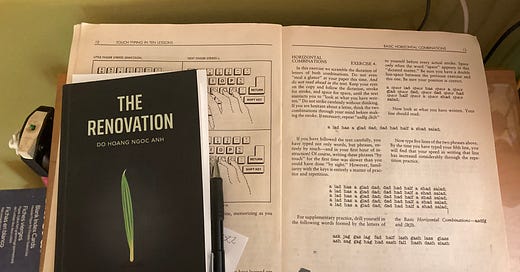Her mother has died, starved of affection and food by her father’s devotion to one war after another, the one with Saigon, the one with China, and the one with the Khmer Rouge. The novel doesn’t specify but those are the dates.
Lots of war. In peace the widower devotes himself to building an infantry sand table in their one room to understand the terrain. He had saved the life of a general then asked him at demobilization to get his daughter into school, so there she is.
She arrives a month late, harassed and ignored then harassed again by students and teachers, as she fails to parrot the textbook accurately in extenso, with feeling. The entire school is training directly to a city-wide test. She walks out.
It is now the new economic order after 1986 when everyone in the collective building has scattered to at last make some money. Her father divines from his sand table that now he must take over the old guard-room to run as a co-operative store on a voluntary basis.
She must pitch in gratis to redeem herself to get back into school. She instead leaves for her grandmother’s in the countryside, then south to the city where she rents a bench to sleep on in the household of a fictive auntie
nights after long shifts in food prep at a restaurant. She spends her day off, when she must surrender her bench at dawn, shopping for sales at the new supermarket, filling a bag of consumer goods which she takes north to her grandmother just before new year’s.
Her grandmother, as starved as her mother and mad as her father in her own more nurturing, practical, way puts all those gifts away for a rainy day, saving up for her grand-daughter detergent and soap and plastic that can only become cheaper and more abundant.
The young woman heads back to work where she plans to cover shifts over the new year celebrations. Even when I arrived in-country 10 years later many businesses shut down and sent everyone home to the countryside
over long weeks of Tet. But her job is in a modern operation where every shift is scheduled, where every supply and serving and all the waste is measured and weighed. You could call that modern management under capitalism
but you could also call it modernity for short. There are no human relationships in this story, so far as I have read, that sustain life over generations. It is all đoạn tuyệt, as Nhat Linh titled his novel of the 1930s, rupture.
Grim, when I think about it. But there is something alive and sweet in the young woman that the cover by Francisca Mandiola also conveys. Francisca is from Chile, where authorities once kidnapped, tortured, and murdered a graduate of my high school who did exactly what I am doing right now.
Life goes on, green growing out of shit. As this novel has carried on some entropy has crept in as well, though. The writing remains fundamentally clear and lovely and strong, distinctive though common speech,
but a few pages here and there fall apart as if a wind scattered the words. It is hard to make a book on your own, as it is hard to make a life without coherent parents and a structured society. But this novel and its heroine soldier on.
I have left her for a moment as she goes back to work. I look forward to returning in a month.
This was the sixth of 10 Viet Nam letters so far about The Renovation by Do Ngoc Hoang Anh. The first appeared on February 16, 2022, the second on February 23, 2022, the third on March 12, 2022, the fourth on April 2, 2022, and the fifth on May 2, 2022.
After this sixth letter on The Renovation the seventh came on July 16, 2022, the eighth on September 10, 2022, and the ninth on September 14, 2022.
The tenth letter concerning The Renovation by Do Ngoc Hoang Anh, on May 29, 2023, was also the first on Đổi Mới by Đô Hoàng Ngọc Ánh.
Viet Nam letters respects the property of others under paragraph 107 of United States Code Title 17. If we asked for permission it wouldn’t be criticism. We explain our fair use at length in the letter of September 12, 2022.





